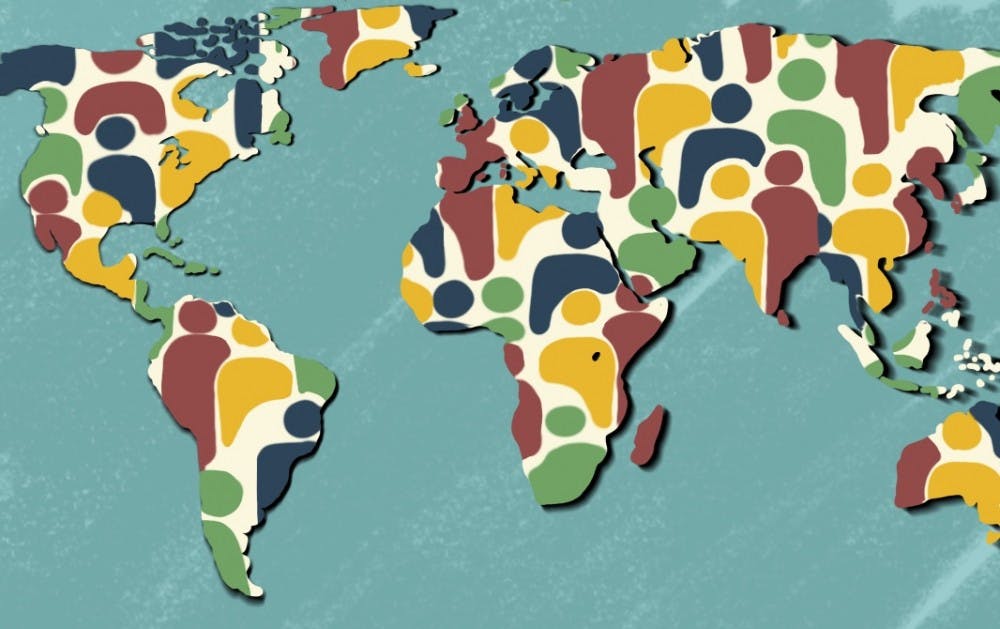This past summer, students from around the world came to ASU to engage in intensive entrepreneurial education in the fields of science and technology hosted by ASU’s Global Launch program. This program specializes in English education for international students while also providing simultaneous instruction in other fields of study.
The instructors worked closely with students on formulating innovative technological projects, pitching presentations to potential investors and starting one’s own business.
Emilia Gracia, the senior global educator at Global Launch, said they put these international students through a revision process by a variety of different experts.
"With that, students really began to learn what it takes to prepare a good presentation and to anticipate what types of questions might be asked of their business,” Gracia said.
The students who attended this summer’s program came from the University of Guadalajara in Mexico, King Abdullah University of Science and Technology in Saudi Arabia and Nanzan University in Japan.
Dianna Lippincott, Global Launch’s strategic innovation manager, said the platform creates partnerships with different universities.
“We reach out to them, we meet them at different events or maybe they already have a partnership with a different part of ASU," Lippincott said.
Part of what makes the program unique is its interdisciplinary approach: combining basic English and cultural education with specialized instruction, such as in science.
The program not only prepares international students for smoother integration into American culture but also sharpens them in their areas of interest.
“What we bring to the table is our experience with international students," Gracia said. "We‘re experts in teaching them; we know how to teach them. We know what they need to be prepared for university studies. We have the intercultural competence that’s needed to effectively teach international students, and so when we combine that with subject-matter expert, we can get a really great program."
Steve Cho, a lecturer in the Polytechnic School of the Fulton Schools of Engineering, provided that expertise with his skills in technological entrepreneurship.
As a veteran of various technological entrepreneurship industries, Cho worked with the students to help them come up with their project designs, present them persuasively to an audience and hone their entrepreneurial talents.
“If you know entrepreneurship, you’ll always have a way to take care of yourself," Cho said. "I think that’s what my big mission of coming here is. I spent 28 years in the industry, and my big goal as a teacher is to give people the skills so that when they leave here, they can thrive."
Among the universities invited to ASU’s campus was the King Abdullah University of Science and Technology. Students from KAUST divided into four groups and worked on their respective technology-related business ideas, working all the way from the initial stages of design towards their final pitches in front of investors.
One of the projects included an AI program for a clothing app, which Cho describes as essentially “Kayak for clothes.” Other projects include a shopping bazaar in which people with no formal training can learn to make new products, such as soccer balls with sensors to evaluate each players’ relative skill level and a bracelet for individuals with autism designed to gauge their emotional states non-verbally.
“The most interesting one was probably the autism bracelet,” Cho said. “The extent of autism in Saudi Arabia is much higher than the U.S., and they don’t have the healthcare or infrastructure to help people like we do here.”
Cho said that even though people may not be verbally responsive, the bracelet can pick up physical cues that show how they’re responding.
“Although the person may not be responsive, there can be physical cues going on inside," Cho said. "So what they’re doing is using multiple sensors such as temperature, pulse rate, skin response to see if they can find states where people can talk, at least communicate, non-verbally what their emotional state is.”
For those directly involved in running these programs, Global Launch epitomizes ASU’s goal of inspiring innovation and change, not just at home but also abroad.
“We’re trying to inspire these people to change their lives and to change their countries and to change the world," Lippincott said. "I think these programs play some part in that."
Lippincott said because ASU is the most innovative university in the U.S. and has such an emphasis on access, the University has a responsibility to share that with the world.
"So to bring these people in, even if just for a few weeks or a month, to expose them to all that ASU is and all ASU has to offer, will help them to go home and have new ideas and make change in their world too," Lippincott said.
Editor's note: a previous version of this article misidentified Emilia Gracia as Emily Garcia. The article has been corrected to reflect this change.
Reach the reporter at Ryan.Ferdowsian@asu.edu or follow @FerdowsianRyan on Twitter.
Like The State Press on Facebook and follow @statepress on Twitter.




